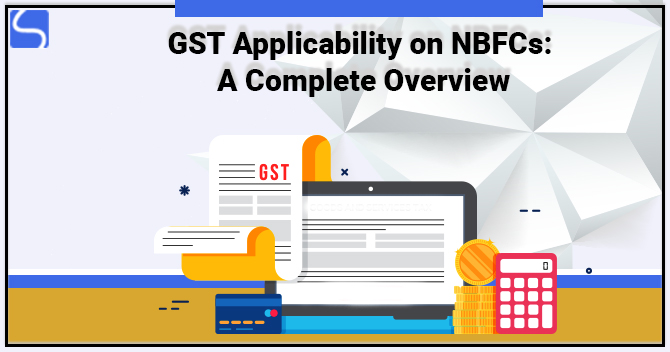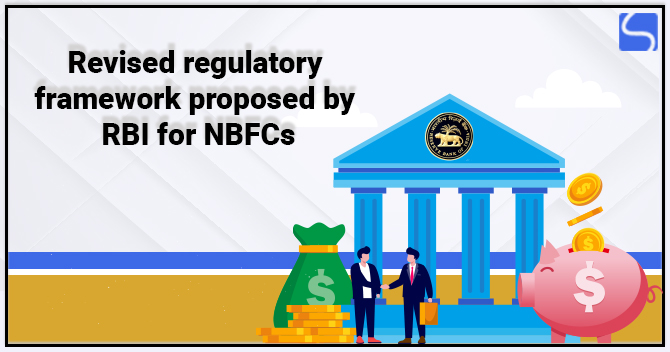GST Applicability on NBFCs: A Complete Overview

Karan Singh | Updated: Mar 22, 2021 | Category: GST, NBFC
After implementing GST (Goods and Service Tax) in India, it brings a significant change from the present tax regime. Unlike the past tax regime, it is completely free and transparent from complications. The introduction of GST in India has made it easy and smooth for the tax authority to get free from tax evasion and corruption. GST not only increase the growth of the Indian Economy but also assist the Government of India to increase its revenue. In this blog, we discuss about the concept of GST applicability on NBFCs. But before starting the concept of the GST applicability on NBFCs, we must understand the basics of GST in India.
Table of Contents
What is GST? – An Overview
The full form of GST is Goods and Services Tax; it is the indirect tax that has removed other indirect taxes in India. It is a complete and purpose-based tax in India that was passed by the Indian Parliament in March 2017, but it came into reality in July 2017. Goods and Services Tax is charged on every value addition; it will be executed on every sale stage.
GST Applicability on NBFCs in India
Following is the list of GST applicability on NBFCs (Non-Banking Financial Companies) in India:
- 18% on Processing Fees;
- 18% on Syndication or Controller Fee;
- 18% on Commission Income and;
- 18% on Swap Charge and Foreclosure.
Following are some of the prominent provisions of GST on NBFCs:
- Before the implementation of GST in India, the services tax was 15%, but after GST, the services provided are taxable at 18%;
- Before GST, Central Registration was required, but after GST, one is required to attain State-wise GST Registration;
- Integrated Goods and Services Tax (IGST) will be appropriate to inter-state supplies of services same that occur between the branches of the same company;
- 37 Returns for each state in India, whereas 61 returns in the case of TDS (Tax Deducted at Source) and ISD (Input Service Distributor) provision are applicable.
What are the Benefits of GST Applicability on NBFCs?
Following is the list of all the benefits of GST Applicability on NBFCs (Non-Banking Financial Companies):
- The Goods and Services Tax (GST) has combined all the different indirect taxes, such as sales tax, purchase tax, state cess, excise duty, etc.
- Since Goods and Services Tax is based on digital compliance and returns filing, therefore, the Non-Banking Financial Companies can make sure that their GST Return Filing and other compliances are addressed without any problem.
- The primary idea behind Goods and Services Tax (GST) requires only such businesses that have ayearly turnover of Rs. 12 lakhs for GST Registration in India. So, it permits advancing businesses functioning at a small-scale to get freedom from obtaining tax registration and additional, cut their functioning costs to a significant amount.
Possible Aspects of GST on NBFCs
Following are some vital aspects of GST applicability on NBFCs in India:
- Place of Supply: The place of supply for financial and banking services such as stockbroking services to any person or individual should be at the place of the recipient of facilities on the dealer of services record. As per Section12 (12) IGST Act, 2017, in case the location of the beneficiary of services is not on the supplier records, then the supply location shall be the place for the supplier of amenities.
- Input Credit Tax: Section 17 CGST Act offers two different options for Input Credit Tax, and you can check the same below:
- Every month gain an amount equivalent to 80% of eligible Input Tax Credit in capital goods and input services in that particular month. The rest will be lapsed as per Rule 3 of ITC.
- According to Section 17 (2) of the CGST Act or Central Goods and Services Taxand Rule 7 of ITC, take input tax as is attributable to the taxable supply and not for relieving supply.
Rule 3 of Input Tax Credit
Non-Banking Financial Companies in India are operating a business in the supply of services by receiving deposit or expending credit cannot attain the credit of paid tax regarding input services that are utilized for the purpose of non-business. Additionally, these companies cannot gain credit attributable to supplies as per Sub-Section (5) of Section 17. Apart from this, in the purview of Sub-Section (4) of Section 17, Non-Banking Financial Companies will benefit credit of tax paid regarding services & inputs. The rest of the amount, 50%, will be the ITC (Input Tax Credit)permissible for the company. To avail of this credit, taxpayers require to take benefit of the GSTR-2 Form.
Reference of Section 17 (2) of CGST Act 2017, for understanding GST Applicability on NBFCs
In the case of goods or services or both of them are used by a registered individual moderately in order to effect taxable supplies comprisingzero-rated supplies under Central Goods and Services Tax Act and under the Integrated Goods and Services Tax Act and relatively for causing exempt supplies under both Acts, the credit amounts are restricted to so much of the input tax as is attributable to the suggested supplies comprising the zero-rated supplies.
Reference of Section 17 (4) of CGST Act 2017, for understanding GST on NBFCs
A financial company like Non-Banking Financial Company (NBFC) will have a choice to obeys the provisions of sub-section (2) or obtain 50% of ITC (Input Tax Credit) available for input services, inputs, and capital good in the month. The remaining shall be lapsed provided:
- Once the option applied will not be withdrawn at the time of remaining financial year;
- The limitation of 50% will not apply to the tax, which has to be paid on the supplies made by a single registered individual to other registered individuals having the same PAN or Permanent Account Number.
Conclusion
The provisions relating to the GST applicability on NBFCs has been explained above, but the government needs to introduce more reforms to reduce the burden on NBFCs. These companies were expecting the government to take some creative measures in this direction to ease the burden of the tax.
Also, Read: Prerequisites of NBFC Registration in India – An Overview















